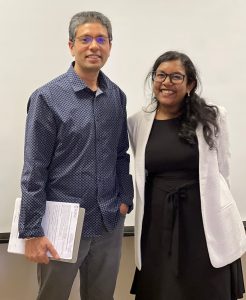Meetha James successfully defends SIE PhD thesis

On April 12 2024, Meetha Nesam James Ravindran Santhakumar successfully defended her PhD thesis titled “”TOWARDS A PLEASURABLE FOOD EXPERIENCE: INFLUENCING PEOPLE’S LIKING, TASTE PERCEPTIONS, AND MEDIATED EMOTIONS USING AUGMENTED FLAVOR EXPERIENCES”.
She was advised by Dr. Nimesha Ranasinghe. Drs. Kate Beard, Nick Giudice, Silvia Nittel and Mary Camire served on her committee.
Dissertation Abstract:
The multisensory nature of food and beverage flavors plays an integral role in our everyday lives. While eating is primarily for survival, individuals seek pleasure in their eating experiences through diverse means. Prior research has acknowledged that the experience of flavor is inherently multisensory, engaging the five basic senses (taste, smell, sight, touch, and hearing) and integrating additional sensory inputs(temperature, humidity, spatial smell, lighting, and even the visual and tactile characteristics of cutlery). To enhance the pleasure of consuming food and beverages, individuals consider various perceptual and cognitive factors, including the pleasure derived from taste sensations, overall hedonic liking of flavor experiences, and the elicited emotions evoked while eating.
In the emerging fields of Spatial Computing and Human-Computer Interaction (HCI), the study of Human-Food Interactions (HFI) is gaining attention. Yet, research on flavor-based digital interactions, especially how multisensory and spatial sensory stimuli affect eating experiences and flavor perception, is still in its infancy. Therefore, this dissertation presents an innovative approach to studying various multisensory and spatial sensory stimuli (without altering the food), their effective combinations, and their impact on flavor perception, especially in terms of liking, taste sensations, and emotions, which contribute towards pleasurable flavor experiences.
Our research involved user studies exploring the effects of multisensory cues on food, food-based videos, spatial sensory cues, and immersive videos in Virtual Reality on flavor perception. The key findings of this dissertation are:
1. Positive Hedonic Liking: All the tested external multisensory and spatial sensory stimuli configurations led to overall positive hedonic liking scores from participants.
2. Differentiated Taste Sensations: The results revealed significant differences in taste sensations elicited by different stimuli configurations.
3. Elicited Emotions: The research observed that different multisensory and spatial sensory stimuli configurations could elicit various emotions, highlighting the potential of using digital external stimuli to enrich the eating experience emotionally.
1. Positive Hedonic Liking: All the tested external multisensory and spatial sensory stimuli configurations led to overall positive hedonic liking scores from participants.
2. Differentiated Taste Sensations: The results revealed significant differences in taste sensations elicited by different stimuli configurations.
3. Elicited Emotions: The research observed that different multisensory and spatial sensory stimuli configurations could elicit various emotions, highlighting the potential of using digital external stimuli to enrich the eating experience emotionally.
This work paves the way for innovative approaches in augmented dining experiences, employing digital multisensory and spatial sensory stimuli to elevate the pleasure of eating. Our findings suggest promising directions for future investigations that explore augmented food experiences using digitally controllable multisensory stimuli to create pleasurable dining experiences.
